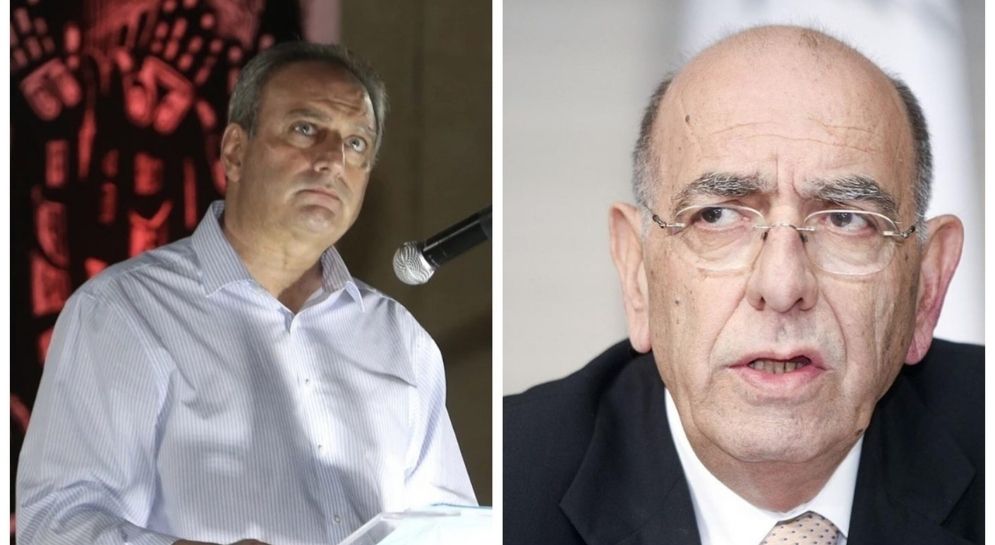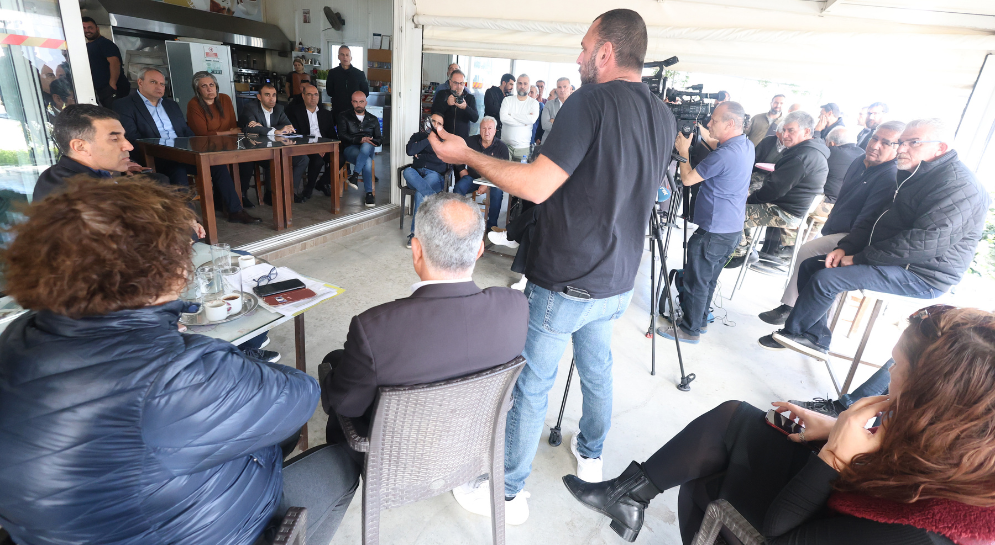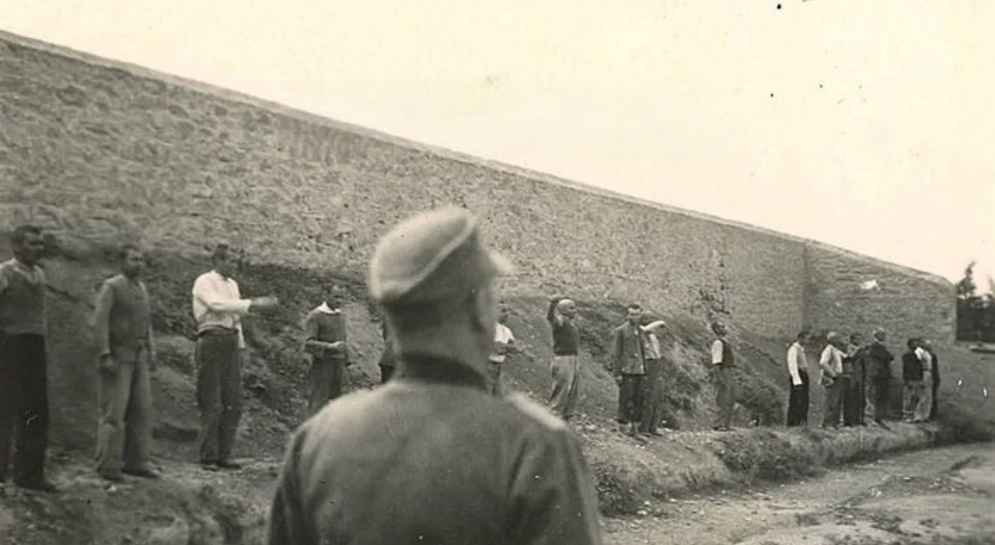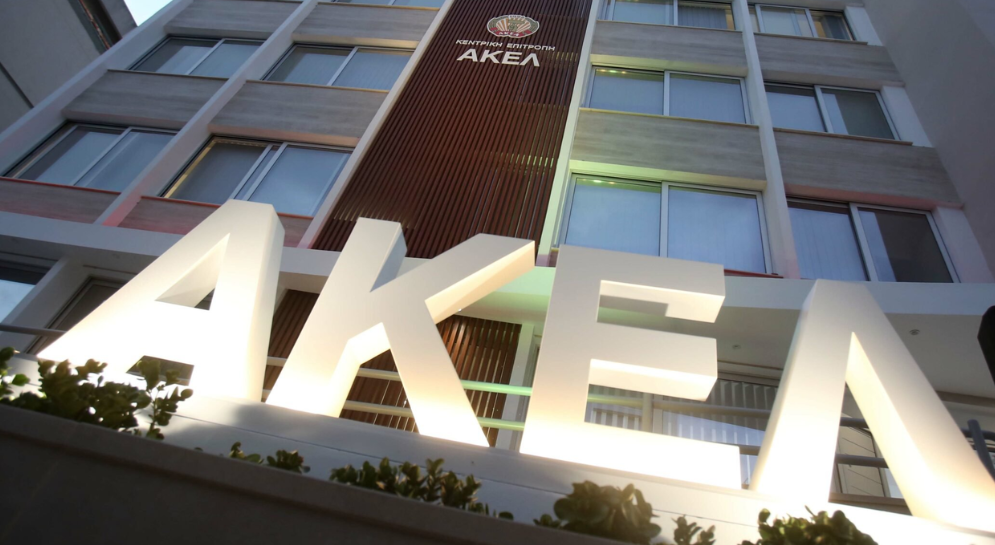
Speech by the General Secretary of the C.C. of AKEL Stefanos Stefanou at the event in memory of Kostas Papakostas, Municipal Theatre of Latsia
14 December 2021, AKEL C.C. Press Office, Nicosia
I would like to congratulate the Pancyprian Association of Democratic Resistance Fighters for choosing the “Day of Democratic Resistance” to honor the memory of a true defender of the ideals of freedom and democracy.
A profound democrat who throughout his life was marked by and marked our people’s struggles for independence and democracy.
The late friend and co-fighter Kostas Papakosta.
I am honored to have the opportunity to speak at today’s event about Costas Papakostas and I thank you warmly for the invitation.
I got to know Kostas in person in Parliament. At that time I was working in the office of Demetris Christofias, who then was President of the House of Representatives. Since then I had appreciated the humility of his character, clear discourse and consistency to his convictions.
I was fortunate later on to work closely with him when he assumed the Ministry of Defence in the Ministerial Cabinet. Of all the things I noted about his character, I would single out the incredible dedication with which he carried out his duties! I would also say that he was delightful in his storytelling and had a lot to say. He was extremely pleasant to be around with. Warm and approachable, he immediately won over his interlocutor and colleagues, all of whom have nothing but the best words to say about him.
Permit me to begin my speech by making referring to an extract from Papakostas’ book “Windward march”, which – in my opinion – accurately describes the whole essence and content of Kostas’ life.
“One day around the end of May 1973, the Commander of the Heavy Weapons Company Greek officer Pouleas, called me into his office to announce my transfer from the National Guard to the newly founded by Makarios ‘Special Police Reserve Force’, whose mission was to fight EOKA B. He even had the audacity to advise me not to accept this transfer by telling me the following: “It is a pity, you are a very good officer and where you’ll go you will put yourself in a difficult position and will regret it”. When I asked him what he meant by that, he replied, “And if you are confronted with your former Leader (in EOKA), Grivas, what will you do?” Then, without hesitation, I replied directly that “if my life or the lives of my men are at stake, I will not hesitate to pull the trigger”. When I was arrested in the coup d’état, Pouleas came to my prison cell and reminded me of the conversation we had in his office at the time and asked me if I regretted my decision. I replied that “not only do I not regret it, but I consider it an honor to be where I am”.
Faith in the ideals of democracy and freedom, love for his country and justice, as well as personal dignity and honor, accompanied Kostas Papakostas all through his life until the very end. He was always at the forefront of the struggle, unyielding in his duty.
Papakostas was, like thousands of other democratic patriots, a living witness to the tragic fate of our country, which to this day is still a victim, not because of some “chance events”, nor as a result of “youthful spontaneous” or “foolish actions” of “immature some young men who were carried away by the vision of union with Greece, Enosis” – as numerous modern day revisionists claim in order to conceal the historical truth – but instead this was a well-planned crime executed to serve imperialism’s designs with willing executioners, both Cypriot and foreign traitors.
Papakostas’ journey through the ranks of the Cyprus Army, the National Guard, his experiences and experiences in the bicommunal clashes of 1963-64, but first and above all, his activity within the ranks of the Special Reserve Force in the fight against EOKA B were what shaped his consciousness and political identity. A lover and servant of democracy, an honest and genuine patriot, Papakostas naturally culminated in being a consistent and loyal fellow co-fighter of the Left and AKEL.
Kostas Papakostas understood what some people deliberately or out of ignorance overlook. Namely, the sinister role of imperialism in the tragedy of Cyprus. He understood the subversive role played by nationalism-chauvinism in the destruction of Cyprus. Such was his conviction to his absolutely correct understanding of nationalism-chauvinism that he did not hesitate to take an outspoken stand on issues that for decades were a taboo and covered up by a veil of guilty silence. I am talking about the intercommunal conflicts of 1963-64. It was about these conflicts, which were the prelude to the Cyprus tragedy of 1974, that Kostas wrote the following:
“Unfortunately, neither the Turkish Cypriots, but nor the Greek Cypriots believed then in the unitary state. They both considered it (the Republic of Cyprus) a stepping stone for the fulfilment of national goals. The Greek Cypriots striving for Cyprus’ union with “motherland” Greece, while the Turkish Cypriots for union with “motherland” Turkey. Hence, we arrived with mathematical certainty to that dreadful July of 1974, when we were confronted with the treacherous coup d’état and the brutal Turkish army invasion. Both these evils were certainly not accidental. They were premeditated and planned actions executed to serve foreign interests.”
As Captain of the Special Reserve Forces from June 1973 until that black summer of July/August 1974, he took part in almost all the operations/raids to capture and dismantle the illegal armed underground groups of EOKA B. Endless days and nights away from his family, a period of constant anxiety and instability at the risk of his own life, Papakostas continued unabated with even greater vigor because he was fully aware that the fanatical mercenaries of EOKA B, submissive instruments of foreign interests, would lead our country to destruction.
The outbreak of the coup d’état found him and his family in the village of Kakopetria. From there, he tries to organize his Company in Famagusta and Larnaca, full of anger and indignation that at this juncture he found himself cut off from his men.
At the same time, he is organizing groups of armed anti-fascist resistance fighters in the area and constantly working on resistance plans based on the little information he manages to gather. The bastion of resistance was lost after the collapse of the city of Limassol. Papakostas’ armed group ended up at the village of Panagia in Paphos and after receiving a message from Makarios to end the resistance so as to avoid a bloodbath, the decision was taken to be handed over to the coupists.
Regrettably, the resistance was defeated by the superior military strength of the Greek junta-infiltrated National Guard and the Greek Army military contingent in Cyprus (ELDYK). Arrests, murders, torture and imprisonment followed. The prisons were filled with hundreds of democratic citizens, members and cadres of AKEL, loyal policemen of the Presidential Guard, the Special Reserve Force, etc. Papakostas was among them. He was imprisoned and tortured, but he did not give in and yield.
On 20 July 1974 with the beginning of the Turkish army invasion of Cyprus he answered the call! “Free us from prison so we can go and fight”, “Let us out of prison so we can go and defend our country”. These were the words of all the democratic prisoners who had filled the prisons rounded up by the coupists between 15th and 20th of July. Papakostas was among them. He became a Captain in the 301 Infantry Battalion and headed for Agios Hermolaos where, with few weapons and soldiers, he stood up and fought the modernly equipped Turkish army. And this at a time when coupists who swore themselves as “officers” were abandoning their units and leaving the soldiers to be led to the slaughter that was to follow. Subsequently, 301 Infantry Battalion was reconstituted as an independent special operations company and Papakostas took command operating in the Pentadaktylos mountain range.
He was a shining example of bravery during the Turkish invasion. A farsighted officer whose decisions and leadership saved his soldiers on many occasions from certain death when facing far superior Turkish army forces.
Kostas Papakostas in his later career continued to serve his country with vigor and self-denial and left his indelible mark wherever he passed. In 1978 he was seconded back to the Police and established the Special Rapid Action Unit (M.M.A.D.), whose mission was to combat terrorism and organized crime. In 1984 he was permanently appointed to the Police with the rank of Senior Marshall.
In June 1991, during the Vasiliou government, he was appointed Deputy Chief of Police. In January 1996, he resigned, in protest at the erroneous state of affairs of the Police force, since after the election of DISY leader Clerides in 1993 and assumption of power by DISY, a period of total cronyism and clientelism followed, together with the dismantling of the MMAD unit and other sections of the force not yet under the control of DISY party. His resignation, almost three years early, at the very moment when the Chief of Police was due to retire in six months and he was to contest for the post, shows the intolerable climate created against him by the then circle in power. But it also shows something else. It shows the indomitable character of Kostas, who, putting above all else the service and efficiency of the Police Force, which was being undermined by the clientelism/cronyism promoted by DISY, preferred to resign rather than to compromise with the new pathetic reality imposed by those in power at the time.
Papakostas, who proudly resisted and ended up behind bars for defending democracy in 1974, remained the same person. No position, nor any post/duty he undertook changed him. It was what he believed. And he believed what he was. A Democrat. A patriot. Dignified. Honest. With integrity.
On his rallying with AKEL and election as a Member of Parliament on the AKEL-Left-New Forces ballot in the Famagusta district, his following reference is characteristic:
“Around mid-February 1996 I received a phone call from the then General Secretary of AKEL, my friend Demetris Christofias ….I went to the appointment and was surprised to hear the General Secretary propose that I accept to be a parliamentary candidacy with AKEL – Left – New Forces in Famagusta district, on the condition that the Party bodies of the district would vote for me as a candidate in the list of eleven candidates.
I thanked Demetris Christofias for the honorary proposal that he made to me and I said that I will think about it and that I will give an answer within the next 15 days, which was the last deadline we had because, as he told me, the inter-party procedures would begin. I personally had reservations, which I expressed to Demetris Christofias:
But how is it possible, Demetri, I said to him, that the AKEL supporters will vote for me, a person coming from the right-wing and being a fighter of EOKA in ’55-59?” He replied that the people of AKEL know how to honor the genuine fighters and know who Papakostas is who resisted the coup and fought for democracy.”
Papakostas was elected MP for Famagusta with AKEL-Left-New Forces in the 26th May 1996 elections and re-elected in the 27th May 2001 and 21st May 2006 elections. Throughout his term in the House of Representatives, before being appointed Minister of Defence in the Christofias government, Kostas Papakostas served AKEL and the Left with consistency, honoring the trust shown to him by the people of the Left. He worked with the same consistency and dedication after his appointment as Minister of Defence.
It is unfortunately a bitter and tragic irony that this State, this country, to which he had contributed so much to through his struggles and services, would at the end of his life suffer the bitter cup of spinelessness, malice, fanaticism and petty political considerations.
The tragic explosion at the Mari naval base is a case that hurts first and foremost the relatives of the victims. Unfortunately, however, it is also a case that has been savagely exploited politically with the goal of damaging the government of the Left and to destroy all those who served it. Kostas fell victim to these expediencies.
He was sentenced not just to prison, but suffered behaviour that no one deserves, let alone a patriot who has given so much to his homeland. It is significant that for sixteen months the Ministry of Justice refused to give him permission to be allowed to walk in the hospital yard when medical councils were declaring that he needed to do so because his life was in danger. This from a government administration and President who didn’t hesitate to pardon pedophiles and drug dealers or turn a blind eye to national security cases involving third country nationals. Such was the pettiness and malice that the Prison Authorities, evidently following orders from above, even banned him from attending church on Holy Saturday.
Kostas Papakostas had told me about this when I visited him at the General Hospital where he was being treated. It was then that he told me that certain people – one can presume who – had suggested that he change his testimony and testify against Christofias in order to receive preferential treatment. The reply Kostas gave was equal to the one he gave to the Greek coupist officer Pouleas, equal to his brave and dignified path of struggle: He categorically and vehemently refused to do so.
Despite the grossly unjust and inhumane treatment of Kostas Papakostas he did not betray what he was. And he left as he lived: A stout and proud man with integrity.
Kostas Papakostas, we are proud to have worked with you.
We are proud to have been colleagues and fellow combatants.




